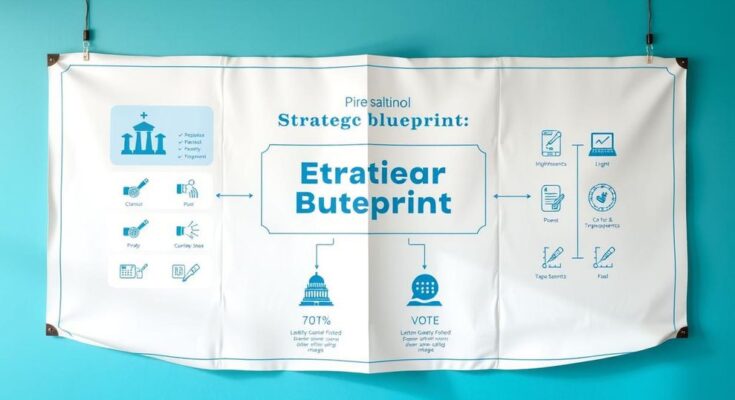The Trinamool Congress (TMC) has developed a comprehensive plan to identify ghost voters for the upcoming 2026 elections, involving the establishment of committees and the appointment of agents. The BJP has responded critically, claiming that TMC’s actions aim to marginalize its supporters and include illegal voters. Voter verification processes are set to begin on April 16, amid allegations of fraudulent registrations.
In anticipation of the 2026 assembly elections, the Trinamool Congress (TMC), headed by Abhishek Banerjee, has devised a comprehensive strategy to identify and eliminate “ghost voters.” The strategy, unveiled during a virtual meeting, includes the appointment of agents and the establishment of committees at various levels. This initiative aims to ensure the accurate identification of fraudulent voters in the electoral process.
The Bharatiya Janata Party (BJP) responded by accusing the TMC of using this strategy to marginalize BJP supporters and include illegal immigrants. Rahul Sinha, a BJP leader, claimed, “The TMC is raising a hue and cry over ghost voters as part of their sinister plan to exclude Hindi-speaking voters.” This statement suggests a political motive behind TMC’s efforts to validate voter authenticity.
The TMC has outlined a timeline for the voter list verification process, commencing on April 16, which will span until the elections. The formation of various committees is scheduled as follows: block and town committees will be established between March 21 and March 27; panchayat and ward committees between March 28 and April 3; and booth-level committees from April 4 to April 14. These committees will consist of local leaders and elected officials to ensure comprehensive coverage.
Moreover, Chief Minister Mamata Banerjee has alleged that the BJP is enrolling illegal voters from other states with the assistance of the Election Commission of India (ECI). During a statement on February 27, she expressed her concerns about potential voter fraud, stating, “We will foil your plans.” This accusation reflects ongoing tensions between the two parties regarding voter integrity in West Bengal.
The ECI clarified on March 1 that identical EPIC numbers do not necessarily indicate duplicate or fake voters, attributing inconsistencies to the decentralized and manual processes employed in various states. The commission has announced plans to assign unique EPIC numbers and update the ERONET 2.0 platform to enhance voter registration accuracy.
Additionally, opposition parties are pressing for discussions on voter registration during the upcoming Budget session of Parliament. A top TMC leader noted that multiple opposition parties have requested a dialogue with NDA ministers concerning electoral integrity. The TMC plans to engage in meticulous checks during a house-to-house survey and appoint booth-level agents to collaborate with electoral officials in verifying voter identities.
Under the proposed plan, any concerns raised by the appointed booth-level agents will be processed through Form-7 to initiate objections against questionable voters. District presidents are tasked with forming committees to address the voter registration issue, thereby consolidating efforts across various leadership roles within the party.
In light of these developments, BJP leaders have also accused TMC of recruiting infiltrators as voters, maintaining the narrative that the TMC is deflecting attention away from illegal immigration. This ongoing political rivalry will shape the landscape as both parties prepare for the forthcoming elections.
In summary, the Trinamool Congress has launched a detailed initiative to identify ghost voters ahead of the 2026 elections, highlighted by the establishment of various committees and appointment of agents. The BJP’s accusations against TMC, alleging a ploy to marginalize its supporters, further intensify the political discourse. As voter verification processes are set to commence, the integrity of electoral registration remains a contentious issue between the two parties. The TMC’s plan and BJP’s counterclaims will critically influence the electoral environment leading up to the elections.
Original Source: www.hindustantimes.com




